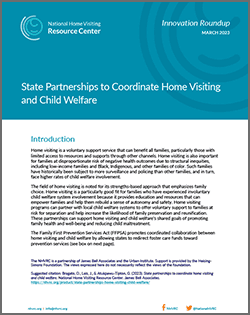
 The Family First Prevention Services Act (FFPSA), signed into law as part of the Bipartisan Budget Act of 2018,* represented a shift in the child welfare system to prevention and family preservation. As part of FFPSA, states can use optional, time-limited funds administered through the Title IV-E Foster Care program for evidence-based services that may prevent children’s entry into foster care. These include early childhood home visiting, a voluntary, strengths-based mode of service delivery that emphasizes family autonomy. Programs can partner with local child welfare systems to offer education and resources that empower families to make their own informed decisions. Such collaborations can support shared goals of promoting family health and well-being and reducing child maltreatment.
The Family First Prevention Services Act (FFPSA), signed into law as part of the Bipartisan Budget Act of 2018,* represented a shift in the child welfare system to prevention and family preservation. As part of FFPSA, states can use optional, time-limited funds administered through the Title IV-E Foster Care program for evidence-based services that may prevent children’s entry into foster care. These include early childhood home visiting, a voluntary, strengths-based mode of service delivery that emphasizes family autonomy. Programs can partner with local child welfare systems to offer education and resources that empower families to make their own informed decisions. Such collaborations can support shared goals of promoting family health and well-being and reducing child maltreatment.
This brief highlights four state partnerships to coordinate services across the two fields:
- Illinois
- Michigan
- New York
- Ohio
It concludes by discussing shared progress, challenges, and plans for further work. For example, multiple states mentioned the importance of building understanding between caseworkers and home visitors and reducing stigma surrounding both types of services. Others reiterated the limitation that FFPSA funding for home visiting is only available to families with open child welfare cases, requiring busy caseworkers to keep cases open. States have found creative ways to manage this challenge so far, and plan to determine how to keep funding home visiting services after involvement with the child welfare system ends.
*See the full brief for citations.
Suggested citation: Bragato, D., Leis, J., & Atukpawu-Tipton, G. (2023). State partnerships to coordinate home visiting and child welfare. National Home Visiting Resource Center. James Bell Associates. https://nhvrc.org/product/state-partnerships-home-visiting-child-welfare/
Acknowledgments: Thank you to Jaime Russell, Thay Guirguis, Kate Rood, Nancy Rostoni, Lucinda Caruso, Karen Kissinger, Allison Contento, Hannah Knies, and Janene Kehl for sharing information about their coordination efforts. Thank you to Allison Meisch, Joelle Ruben, and Jill Filene for shaping and editing the brief. Kristine Neurauter provided formatting support.